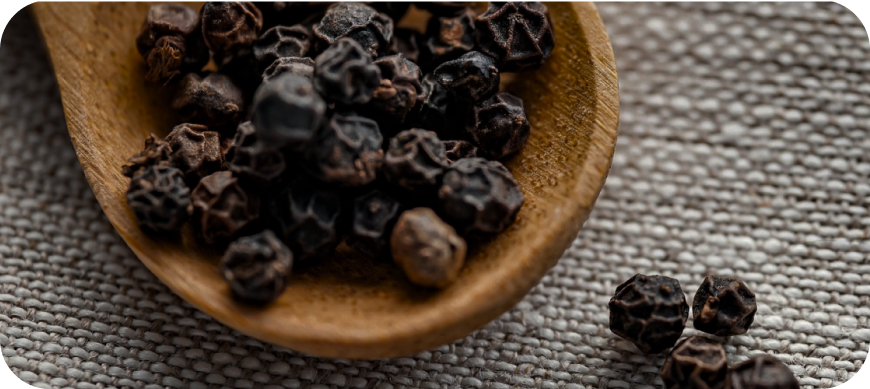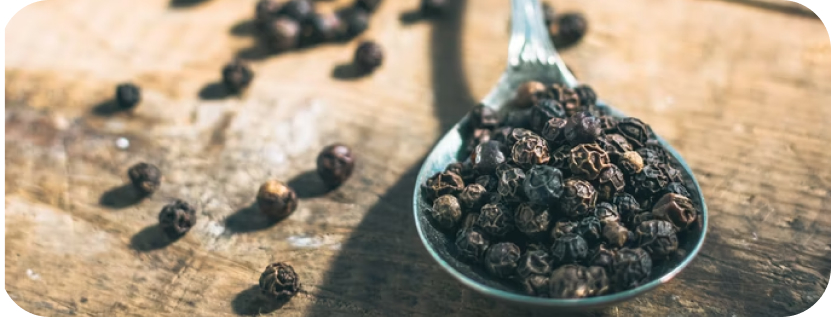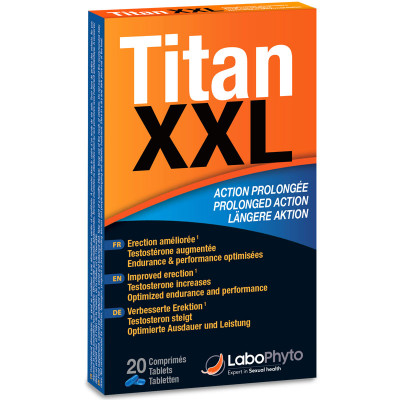
All about Black Pepper
Reading time: 20 minutes
Black pepper is one of the most widely used spices in the world. It is obtained by grinding peppercorns, which are dried berries from the Piper nigrum vine. It has a tangy, slightly spicy flavor that goes well with many dishes. But black pepper isn't just a staple in the kitchen.
It is considered the "King of Spices" and has been used in Ayurvedic medicine for thousands of years due to its high concentration of powerful and beneficial plant compounds.
What is black pepper?

Black pepper grows in India and other countries in tropical Asia. Black pepper is one of the most widely used spices in the world. Black pepper and white pepper both come from the same plant species. But they are prepared differently. Black pepper is obtained by cooking the dried unripe fruit. White pepper is obtained by cooking and drying the ripe seeds.
People take black pepper by mouth to treat arthritis, asthma, upset stomach, bronchitis, bacterial infection that causes diarrhea (cholera), colic, depression, diarrhea, gas , headaches, libido, menstrual pain, nasal congestion, sinus infections, dizziness, skin discoloration, weight loss and cancer.
Black pepper is applied to the skin to cure measles, nerve pain, itching caused by mites and to treat pain.
People inhale black pepper oil to prevent falls, to help quit smoking, and for swallowing problems.
In foods, black pepper and black pepper oil are used as spices.
How does black pepper work?
Black pepper contains a chemical called piperine. This chemical appears to have many effects on the body. It seems to reduce pain, improve breathing and reduce inflammation. Piperine also appears to improve brain function, but it's unclear exactly how.
What are the health benefits of black pepper?

A high content of antioxidants
Free radicals are unstable molecules that can damage your cells. Some free radicals are created naturally, such as when you exercise and digest food.
However, an excessive amount of free radicals can be formed by exposure to things like pollution, cigarette smoke, and sunlight.
Excess free radicals can lead to major health problems. For example, they have been linked to inflammation, premature aging, heart disease and certain cancers.
Black pepper is rich in a plant compound called piperine, which test-tube studies have revealed to have powerful antioxidant properties.
Studies suggest that a diet rich in antioxidants can help prevent or delay the damaging effects of free radicals.
Test-tube and rodent studies have observed that ground black pepper and piperine supplements can reduce free radical damage.
For example, rats fed a high-fat diet plus black pepper or a concentrated black pepper extract had significantly fewer markers of free radical damage in their cells after 10 weeks than rats fed a high-fat diet. fats only.
Has anti-inflammatory properties
Chronic inflammation can be an underlying factor in many pathologies, such as arthritis, heart disease, diabetes and cancer.
Multiple lab studies suggest that piperine – the main active compound in black pepper – can effectively fight inflammation.
For example, in studies of rats with arthritis, treatment with piperine resulted in a decrease in joint swelling and blood markers of inflammation.
In mouse studies, piperine suppressed airway inflammation caused by asthma and seasonal allergies.
However, the anti-inflammatory effects of black pepper and piperine have not yet been thoroughly studied in humans.
May be beneficial for your brain
Animal studies have shown that piperine improves brain function.
In particular, it has demonstrated potential benefits for symptoms related to degenerative brain conditions like Alzheimer's and Parkinson's disease.
For example, a study in rats with Alzheimer's disease found that piperine would improve memory, with the distribution of piperine allowing the rats to navigate a maze repeatedly and more efficiently than rats not given this compound.
In another rodent study, piperine extract appeared to decrease the formation of amyloid plaques, which are dense clumps of harmful protein fragments in the brain that have been linked to Alzheimer's disease.
However, studies in humans are needed to confirm whether these effects are also seen outside of animal studies.
May improve blood sugar control
Studies suggest that piperine may help improve blood sugar metabolism.
In one study, rats fed black pepper extract had a lower blood sugar spike after consuming glucose, compared to rats in the control group.
Additionally, 86 overweight people taking a supplement containing piperine and other compounds for 8 weeks experienced significant improvements in insulin sensitivity - a measure of how well the hormone insulin removes glucose from the body. blood circulation.
However, it is unknown if the same effects would occur with black pepper alone, as a combination of several active plant compounds was used in this study.
May lower cholesterol levels
High cholesterol is associated with an increased risk of heart disease, which is the leading cause of death worldwide.
Black pepper extract has been studied in animals for its potential to lower cholesterol levels.
In a 42-day study, rats fed a high-fat diet and black pepper extract had lower blood cholesterol levels, including LDL (bad cholesterol). The same effects were not observed in the control group.
Additionally, black pepper and piperine are believed to aid the absorption of dietary supplements with potential cholesterol-lowering effects, such as turmeric and red yeast rice.
For example, studies have shown that black pepper can increase the absorption of the active component in turmeric - curcumin - by up to 2000%.
Further studies are still needed to determine if black pepper itself has significant cholesterol-lowering effects in humans.
May have anti-cancer properties
Researchers speculate that the active compound in black pepper, piperine, may have anti-cancer properties.
Although no human trials have been performed, test-tube studies have found that piperine slows the replication of breast, prostate, and colon cancer cells and causes cancer cell death.
Another test-tube study looked at 55 compounds from spices and found that piperine from black pepper was the most effective in improving the effectiveness of traditional treatment for triple-negative breast cancer, the most aggressive type of cancer.
Additionally, piperine has shown promising effects in laboratory studies for reversing drug resistance in cancer cells – a problem that interferes with the effectiveness of chemotherapy treatments.
Although these results are promising, more studies are needed to understand the potential anti-cancer properties of black pepper and piperine.
Other Benefits
According to preliminary research, black pepper may have many other health benefits:
Promotes nutrient absorption. Black pepper can increase the absorption of essential nutrients like calcium and selenium, as well as some beneficial plant compounds, like those found in green tea and turmeric.
May support gut health. The makeup of your gut bacteria has been linked to immune function, mood, chronic disease, and more. Preliminary research suggests that black pepper may increase the good bacteria in your gut.
Can relieve pain. Although it has not yet been studied in humans, rodent studies suggest that the piperine in black pepper may be a natural pain reliever.
May reduce appetite. In a small study, 16 adults reported reduced appetite after drinking a black pepper drink compared to flavored water. However, other studies have not shown the same effects.
A versatile spice
Black pepper has become a staple in kitchens around the world.
With its subtle heat and strong flavor, it is versatile and can enhance almost any savory dish.
A pinch of ground black pepper can be a tasty seasoning for cooked vegetables, pasta dishes, meat, fish, poultry and many other dishes.
It also pairs well with other healthy seasonings, like turmeric, cardamom, cumin, garlic, and lemon zest.
For an extra kick and a bit of crunch, try coating tofu, fish, chicken, and other proteins with coarsely ground peppercorns and additional seasonings.
Improves your libido
The piperine contained in black pepper has properties on the microcirculation of blood vessels. It increases the blood flow to the penis and promotes the dilation of the vessels on the sexual organs, which increases the swelling of the penis at the time of erection. In addition, micro-vascular dilation acts more on the brain by stimulating the central nervous system responsible for erection.
Black pepper can therefore be used for men to improve the quality of erections and increase blood flow in the sexual organs.
But it can also be intended for women for its antidepressant antioxidant properties, anti breast cancer. Moreover, it causes a micro-vascular dilation on the sexual organs, in particular on the level of the uterus of the woman.
To support you in your sexuality, Labophyto offers several products containing black pepper such as Mensize XL .



%201.png)






